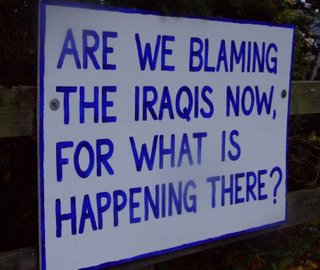
The Sineman's latest post: http://sineman.blogspot.com/2006/10/blaming-iraqis.html
It is not wrong to ask Iraqi security forces to establish and maintain law and order in their country. Admitting shortcomings in that effort is not blaming them, it's...admitting shortcomings.
The fact of the matter is that the conflict in Iraq is the central front in two, yes two, struggles at the moment. The sineman hints at this but doesn't elaborate:
...should we simply leave, there will likely be a power struggle that will likely not be smooth. As a starter, the United States should flatly and unequivocally state that we will not maintain a physical presence in Iraq or in the Middle East for that matter. We are the cause celebre. We create the purpose for the terrorism there. Why can’t we absorb that reality? We need a strategy that draws upon the neighboring states and international bodies that will have respect there.
First, Iraqi and US forces are confronting violence perpetrated largely by Sadr's Mahdi Army. Sadr is a puppet of Iran. He uses his militia to incite sectarian violence to further Iran's agenda of destabilizing Iraq. Iran does not want a stable, democratic Iraq, friendly to the West, on its border.
A complicating factor is that Sadr is a major player in the Iraqi government. He claims that the groups causing the violence in Iraq are "rogue elements" but, he doesn't disavow them, he doesn't reign them in, he doesn't identify them. US forces cannot be seen "going after" him in an aggressive way as it would appear too heavy-handed and Imperialistic on our part. Instead, we are tying to use some finesse to, at a minumum, create the perception that Iraqis are taking control of the country and we are merely supporting them.
We seem to be doing this with some success in Pakistan lately:
http://news.bbc.co.uk/go/rss/-/2/hi/south_asia/6097636.stm
While the Pakistanis are taking credit for this strike, the question arises as to whether this may have been conducted by Task Force 145, the U.S. special operations terrorist hunter-killer teams. Task Force 145 was responsible for the April raid in Danda Saidgai on the al-Qaeda's training camp for Osama bin Laden's Black Guard, his elite praetorian guard. Pakistan initially took credit for the Danda Saidgai strikes, but the Washington Post later revealed this was indeed a U.S. mission. Dawn notes the raid occurred “at around 5:00 am,” which means it was conducted in the dark. Pakistani helicopter pilots would need night training in flight and targeting.
http://billroggio.com/archives/2006/10/airstrikes_in_bajaur.php
Despite earlier reports that the missiles had been launched by Pakistani military helicopters, Pakistani intelligence sources now tell ABC News that the missiles were fired from a U.S. Predator drone plane.
http://blogs.abcnews.com/theblotter/2006/10/zawahiri_was_ta.html
So you see, in spite of the publicly declared Pakistani position that US forces will not operate inside Pakistan...they seem to be doing just that in such a way as not to get too much of a rise out of the Pakistani population.
Second, it's plain that Al Qaeda has as a major goal, the use of a lawless state in the middle east as a base of operations and a training ground and lauching pad for future attacks. They are pursuing this in Iraq. If US forces "withdraw" from Iraq or the entire middle east (gasp)...exactly how would we prevent this?
We cannot rely on other nations or inept International Organizations to provide our nation's defence.
No comments:
Post a Comment